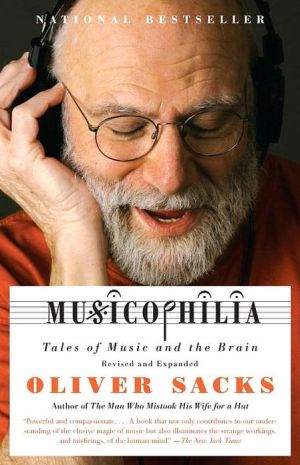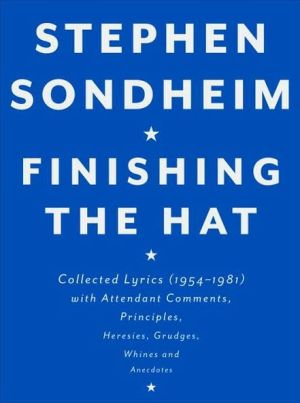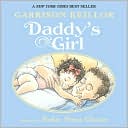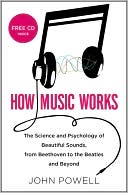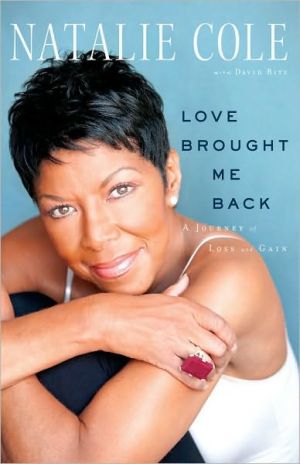Musicophilia: Tales of Music and the Brain
These lush, rewarding reflections on a woman's passage into midlife are grounded in our intimacy with nature and mortality. Deborah Digges, now in her fifties, looks back in such poems as "Boat" to see younger mothers and their children, and ponders her own "brilliant, trivial unmooring." As she wanders from the garden to the barn and into the woods, she finds her moods mirrored in the calendar of the seasons, making lush music of the materials at hand and accepting the seismic changes in her...
Search in google:
Revised and ExpandedWith the same trademark compassion and erudition he brought to The Man Who Mistook His Wife for a Hat, Oliver Sacks explores the place music occupies in the brain and how it affects the human condition. In Musicophilia, he shows us a variety of what he calls “musical misalignments.” Among them: a man struck by lightning who suddenly desires to become a pianist at the age of forty-two; an entire group of children with Williams syndrome, who are hypermusical from birth; people with “amusia,” to whom a symphony sounds like the clattering of pots and pans; and a man whose memory spans only seven seconds-for everything but music.Illuminating, inspiring, and utterly unforgettable, Musicophilia is Oliver Sacks' latest masterpiece. The Barnes & Noble Review When I told my parents that I was pregnant with their first grandchild, my father said, almost sternly, "Well, dear, I do hope you're singing to the baby." I don't know if encouraging an ear for music is an optional stage of fetal development -- it just might be inevitable. The neurologist and essayist Oliver Sacks, in his book of essays entitled Musicophilia, takes on the mysterious internal human drives towards music, often against tough odds. Almost everyone possesses the "neural apparatus" for appreciating music -- Sacks will go on to tell us about some people who, through various neurological accidents, have lost it -- but the sheer human fact of appreciating music at all, he points out, is a very weird thing. "[I]t has no concepts, makes no propositions; it lacks images, symbols, the stuff of language. It has no power of representation. It has no necessary relation to the world."
A Bolt from the Blue: Sudden Musicophilia\ Tony Cicoria was forty-two, very fit and robust, a former college football player who had become a well-regarded orthopedic surgeon in a small city in upstate New York. He was at a lakeside pavilion for a family gathering one fall afternoon. It was pleasant and breezy, but he noticed a few storm clouds in the distance; it looked like rain.\ He went to a pay phone outside the pavilion to make a quick call to his mother (this was in 1994, before the age of cell phones). He still remembers every single second of what happened next: "I was talking to my mother on the phone. There was a little bit of rain, thunder in the distance. My mother hung up. The phone was a foot away from where I was standing when I got struck. I remember a flash of light coming out of the phone. It hit me in the face. Next thing I remember, I was flying backwards."\ Then—he seemed to hesitate before telling me this—"I was flying forwards. Bewildered. I looked around. I saw my own body on the ground. I said to myself, 'Oh shit, I'm dead.' I saw people converging on the body. I saw a woman—she had been standing waiting to use the phone right behind me—position herself over my body, give it CPR. . . . I floated up the stairs—my consciousness came with me. I saw my kids, had the realization that they would be okay. Then I was surrounded by a bluish-white light . . . an enormous feeling of well-being and peace. The highest and lowest points of my life raced by me. No emotion associated with these . . . pure thought, pure ecstasy. I had the perception of accelerating, being drawn up . . . there was speed and direction. Then, as I was saying to myself, 'This is the most glorious feeling I have ever had'—SLAM! I was back."\ Dr. Cicoria knew he was back in his own body because he had pain—pain from the burns on his face and his left foot, where the electrical charge had entered and exited his body—and, he realized, "only bodies have pain." He wanted to go back, he wanted to tell the woman to stop giving him CPR, to let him go; but it was too late—he was firmly back among the living. After a minute or two, when he could speak, he said, "It's okay—I'm a doctor!" The woman (she turned out to be an intensive-care-unit nurse) replied, "A few minutes ago, you weren't."\ The police came and wanted to call an ambulance, but Cicoria refused, delirious. They took him home instead ("it seemed to take hours"), where he called his own doctor, a cardiologist. The cardiologist, when he saw him, thought Cicoria must have had a brief cardiac arrest, but could find nothing amiss with examination or EKG. "With these things, you're alive or dead," the cardiologist remarked. He did not feel that Dr. Cicoria would suffer any further consequences of this bizarre accident.\ Cicoria also consulted a neurologist—he was feeling sluggish (most unusual for him) and having some difficulties with his memory. He found himself forgetting the names of people he knew well. He was examined neurologically, had an EEG and an MRI. Again, nothing seemed amiss.\ A couple of weeks later, when his energy returned, Dr. Cicoria went back to work. There were still some lingering memory problems—he occasionally forgot the names of rare diseases or surgical procedures—but all his surgical skills were unimpaired. In another two weeks, his memory problems disappeared, and that, he thought, was the end of the matter.\ What then happened still fills Cicoria with amazement, even now, a dozen years later. Life had returned to normal, seemingly, when "suddenly, over two or three days, there was this insatiable desire to listen to piano music." This was completely out of keeping with anything in his past. He had had a few piano lessons as a boy, he said, "but no real interest." He did not have a piano in his house. What music he did listen to tended to be rock music.\ With this sudden onset of craving for piano music, he began to buy recordings and became especially enamored of a Vladimir Ashkenazy recording of Chopin favorites—the Military Polonaise, the Winter Wind Étude, the Black Key Étude, the A-flat Polonaise, the B-flat Minor Scherzo. "I loved them all," Tony said. "I had the desire to play them. I ordered all the sheet music. At this point, one of our babysitters asked if she could store her piano in our house—so now, just when I craved one, a piano arrived, a nice little upright. It suited me fine. I could hardly read the music, could barely play, but I started to teach myself." It had been more than thirty years since the few piano lessons of his boyhood, and his fingers seemed stiff and awkward.\ And then, on the heels of this sudden desire for piano music, Cicoria started to hear music in his head. "The first time," he said, "it was in a dream. I was in a tux, onstage; I was playing something I had written. I woke up, startled, and the music was still in my head. I jumped out of bed, started trying to write down as much of it as I could remember. But I hardly knew how to notate what I heard." This was not too successful—he had never tried to write or notate music before. But whenever he sat down at the piano to work on the Chopin, his own music "would come and take me over. It had a very powerful presence."\ I was not quite sure what to make of this peremptory music, which would intrude almost irresistibly and overwhelm him. Was he having musical hallucinations? No, Dr. Cicoria said, they were not hallucinations—"inspiration" was a more apt word. The music was there, deep inside him—or somewhere—and all he had to do was let it come to him. "It's like a frequency, a radio band. If I open myself up, it comes. I want to say, 'It comes from heaven,' as Mozart said."\ His music is ceaseless. "It never runs dry," he continued. "If anything, I have to turn it off."\ Now he had to wrestle not just with learning to play the Chopin, but to give form to the music continually running in his head, to try it out on the piano, to get it on manuscript paper. "It was a terrible struggle," he said. "I would get up at four in the morning and play till I went to work, and when I got home from work I was at the piano all evening. My wife was not really pleased. I was possessed."\ In the third month after being struck by lightning, then, Cicoria—once an easygoing, genial family man, almost indifferent to music—was inspired, even possessed, by music, and scarcely had time for anything else. It began to dawn on him that perhaps he had been "saved" for a special reason. "I came to think," he said, "that the only reason I had been allowed to survive was the music." I asked him whether he had been a religious man before the lightning. He had been raised Catholic, he said, but had never been particularly observant; he had some "unorthodox" beliefs, too, such as in reincarnation.\ He himself, he grew to think, had had a sort of reincarnation, had been transformed and given a special gift, a mission, to "tune in" to the music that he called, half metaphorically, "the music from heaven." This came, often, in "an absolute torrent" of notes with no breaks, no rests, between them, and he would have to give it shape and form. (As he said this, I thought of Caedmon, the seventh-century Anglo-Saxon poet, an illiterate goatherd who, it was said, had received the "art of song" in a dream one night, and spent the rest of his life praising God and creation in hymns and poems.)\ Cicoria continued to work on his piano playing and his compositions. He got books on notation, and soon realized that he needed a music teacher. He would travel to concerts by his favorite performers but had nothing to do with musical friends in his own town or musical activities there. This was a solitary pursuit, between himself and his muse.\ I asked whether he had experienced other changes since the lightning strike—a new appreciation of art, perhaps, different taste in reading, new beliefs? Cicoria said he had become "very spiritual" since his near-death experience. He had started to read every book he could find about near-death experiences and about lightning strikes. And he had got "a whole library on Tesla," as well as anything on the terrible and beautiful power of high-voltage electricity. He felt he could sometimes see "auras" of light or energy around people's bodies—he had never seen this before the lightning bolt.\ Some years passed, and Cicoria's new life, his inspiration, never deserted him for a moment. He continued to work full-time as a surgeon, but his heart and mind now centered on music. He got divorced in 2004, and the same year had a fearful motorcycle accident. He had no memory of this, but his Harley was struck by another vehicle, and he was found in a ditch, unconscious and badly injured, with broken bones, a ruptured spleen, a perforated lung, cardiac contusions, and, despite his helmet, head injuries. In spite of all this, he made a complete recovery and was back at work in two months. Neither the accident nor his head injury nor his divorce seemed to have made any difference to his passion for playing and composing music.\ I have never met another person with a story like Tony Cicoria's, but I have occasionally had patients with a similar sudden onset of musical or artistic interests—including Salimah M., a research chemist. In her early forties, Salimah started to have brief periods, lasting a minute or less, in which she would get "a strange feeling"—sometimes a sense that she was on a beach that she had once known, while at the same time being perfectly conscious of her current surroundings and able to continue a conversation, or drive a car, or do whatever she had been doing. Occasionally these episodes were accompanied by a "sour taste" in the mouth. She noticed these strange occurrences, but did not think of them as having any neurological significance. It was only when she had a grand mal seizure in the summer of 2003 that she went to a neurologist and was given brain scans, which revealed a large tumor in her right temporal lobe. This had been the cause of her strange episodes, which were now realized to be temporal lobe seizures. The tumor, her doctors felt, was malignant (though it was probably an oligodendroglioma, of relatively low malignancy) and needed to be removed. Salimah wondered if she had been given a death sentence and was fearful of the operation and its possible consequences; she and her husband had been told that there might be some "personality changes" following it. But in the event, the surgery went well, most of the tumor was removed, and after a period of convalescence, Salimah was able to return to her work as a chemist.\ She had been a fairly reserved woman before the surgery, who would occasionally be annoyed or preoccupied by small things like dust or untidiness; her husband said she was sometimes "obsessive" about jobs that needed to be done around the house. But now, after the surgery, Salimah seemed unperturbed by such domestic matters. She had become, in the idiosyncratic words of her husband (English was not their first language), "a happy cat." She was, he declared, "a joyologist."\ Salimah's new cheerfulness was apparent at work. She had worked in the same laboratory for fifteen years and had always been admired for her intelligence and dedication. But now, while losing none of this professional competence, she seemed a much warmer person, keenly sympathetic and interested in the lives and feelings of her co-workers. Where before, in a colleague's words, she had been "much more into herself," she now became the confidante and social center of the entire lab.\ At home, too, she shed some of her Marie Curie-like, work-oriented personality. She permitted herself time off from her thinking, her equations, and became more interested in going to movies or parties, living it up a bit. And a new love, a new passion, entered her life. She had been "vaguely musical," in her own words, as a girl, had played the piano a little, but music had never played any great part in her life. Now it was different. She longed to hear music, to go to concerts, to listen to classical music on the radio or on CDs. She could be moved to rapture or tears by music which had carried "no special feeling" for her before. She became "addicted" to her car radio, which she would listen to while driving to work. A colleague who happened to pass her on the road to the lab said that the music on her radio was "incredibly loud"—he could hear it a quarter of a mile away. Salimah, in her convertible, was "entertaining the whole freeway."\ Like Tony Cicoria, Salimah showed a drastic transformation from being only vaguely interested in music to being passionately excited by music and in continual need of it. And with both of them, there were other, more general changes, too—a surge of emotionality, as if emotions of every sort were being stimulated or released. In Salimah's words, "What happened after the surgery—I felt reborn. That changed my outlook on life and made me appreciate every minute of it."\ From the Hardcover edition.
Preface Part I: Haunted by Music1. A Bolt from the Blue: Sudden Musicophilia 2. A Strangely Familiar Feeling: Musical Seizures 3. Fear of Music: Musicogenic Epilepsy 4. Music on the Brain: Imagery and Imagination 5. Brainworms, Sticky Music, and Catchy Tunes 6. Musical Hallucinations Part II: A Range of Musicality7. Sense and Sensibility: A Range of Musicality 8. Things Fall Apart: Amusia and Dysharmonia 9. Papa Blows His Nose in G: Absolute Pitch 10. Pitch Imperfect: Cochlear Amusia 11. In Living Stereo: Why We Have Two Ears 12. Two Thousand Operas: Musical Savants13. An Auditory World: Music and Blindness14. The Key of Clear Green: Synesthesia and Music Part III: Memory, Movement, and Music15. In the Moment: Music and Amnesia 16. Speech and Song: Aphasia and Music Therapy 17. Accidental Davening: Dyskinesia and Cantillation 18. Come Together: Music and Tourette’s Syndrome 19. Keeping Time: Rhythm and Movement 20. Kinetic Melody: Parkinson’s Disease and Music Therapy 21. Phantom Fingers: The Case of the One-Armed Pianist 22. Athletes of the Small Muscles: Musician’s Dystonia Part IV: Emotion, Identity, and Music23. Awake and Asleep: Musical Dreams 24. Seduction and Indifference 25. Lamentations: Music and Depression 26. The Case of Harry S.: Music and Emotion 27. Irrepressible: Music and the Temporal Lobes 28. A Hypermusical Species: Williams Syndrome 29. Music andIdentity: Dementia and Music Therapy Acknowledgments Bibliography Index
\ Michiko KakutaniDr. Sacks writes not just as a doctor and a scientist but also as a humanist with a philosophical and literary bent, and he's able in these pages to convey both the fathomless mysteries of the human brain and the equally profound mysteries of music…\ —The New York Times\ \ \ \ \ Anthony GottliebFreud, despite being both Viennese and a medical man, said he was almost incapable of obtaining any pleasure from music: "Some rationalistic, or perhaps analytic, turn of mind in me rebels against being moved by a thing without knowing why I am thus affected and what it is that affects me." In the end, Sacks's catalog of oddities sheds little systematic light on the mystery of music. He cannot be blamed for this—the science of music is still in its early days. Readers will probably be grateful that Sacks, unlike Freud, is happy to revel in phenomena that he cannot yet explain.\ —The New York Times Book Review\ \ \ Peter D. KramerWhat makes Musicophilia cohere is Sacks himself. He is the book's moral argument. Curious, cultured, caring, in his person Sacks justifies the medical profession and, one is tempted to say, the human race. Nothing is alien to him. If he has been saved by music, he also has been briefly afflicted by amusia, an inability to hear music as music, rather than "toneless banging." In his daily consciousness, Sacks embraces music at an extraordinary level. He writes in passing, "I have lately been enjoying mental replays of Beethoven's Third and Fourth Piano Concertos, as recorded by Leon Fleisher in the 1960s. These 'replays' tend to last ten or fifteen minutes and to consist of entire movements." Sacks is, in short, the ideal exponent of the view that responsiveness to music is intrinsic to our makeup. He is also the ideal guide to the territory he covers. Musicophilia allows readers to join Sacks where he is most alive, amid melodies and with his patients.\ —The Washington Post\ \ \ \ \ Publishers WeeklySacks is an unparalleled chronicler of modern medicine, and fans of his work will find much to enjoy when he turns his prodigious talent for observation to music and its relationship to the brain. The subtitle aptly frames the book as a series of medical case studies-some in-depth, some abruptly short. The tales themselves range from the relatively mundane (a song that gets stuck on a continuing loop in one's mind) through the uncommon (Tourette's or Parkinson's patients whose symptoms are calmed by particular kinds of music) to the outright startling (a man struck by lightning subsequently developed a newfound passion and talent for the concert piano). In this latest collection, Sacks introduces new and fascinating characters, while also touching on the role of music in some of his classic cases (the man who mistook his wife for a hat makes a brief appearance). Though at times the narrative meanders, drawing connections through juxtaposition while leaving broader theories to be inferred by the reader, the result is greater than the sum of its parts. This book leaves one a little more attuned to the remarkable complexity of human beings, and a bit more conscious of the role of music in our lives. (Oct.)\ Copyright 2007 Reed Business Information\ \ \ \ \ Kirkus ReviewsThe gentle doctor turns his pen to another set of mental anomalies that can be viewed as either affliction or gift. If we could prescribe what our physicians would be like, a good number of us would probably choose somebody like Sacks (Uncle Tungsten: Memories of a Chemical Boyhood, 2001, etc.). Learned, endlessly inquisitive and seemingly possessed of a bottomless store of human compassion, the neurologist's authorial personality both reassures and arouses curiosity. Here, Sacks tackles the whole spectrum of the human body's experience of music by studying it from the aesthetic as well as medical viewpoint. Fantastical case studies include a young boy assaulted by musical hallucinations who would shout "Take it out of my head! Take it away!" when music only he could hear became unbearably loud. Less frightening are stories about people like Martin, a severely disabled man who committed some 2,000 operas to memory, or ruminations on the linkage between perfect pitch and language: Young children learning music are vastly more likely to have perfect pitch if they speak Mandarin than almost any other language. A gadfly and storyteller as well as a scientist, the author can't resist a good yarn even when it's not likely to be true, such as the anecdote about Shostakovich claiming that he heard beautiful new melodies every time he tilted his head to one side, due to a piece of German shrapnel lodged in his brain. Sacks is as good a guide to this mysterious and barely understood world as one could ask for, mixing serious case studies with personal takes on music and what its ultimate uses could possibly be. As the book wears on, however, his loose approach makes some later chapters more workthan they should be. Pleasantly rollicking, but with a definite hint that the grand old man is taking it easy. First printing of 100,000\ \ \ \ \ From the Publisher“Dr. Sacks writes not just as a doctor and a scientist but also as a humanist with a philosophical and literary bent. . . [his] book not only contributes to our understanding of the elusive magic of music but also illuminates the strange workings, and misfirings, of the human mind.”\ –Michiko Kakutani, The New York Times\ “Oliver Sacks turns his formidable attention to music and the brain . . . He doesn’t stint on the science . . . but the underlying authority of Musicophilia lies in the warmth and easy command of the author’s voice.”\ –Mark Coleman, Los Angeles Times\ “His work is luminous, original, and indispensable . . . Musicophilia is a Chopin mazurka recital of a book, fast, inventive and weirdly beautiful . . . Yet what is most awe-inspiring is his observational empathy.”\ –American Scholar\ “Curious, cultured, caring, in his person Sacks justifies the medical profession and, one is tempted to say, the human race . . . Sacks is, in short, the ideal exponent of the view that responsiveness to music is intrinsic to our makeup. He is also the ideal guide to the territory he covers. Musicophilia allows readers to join Sacks where he is most alive, amid melodies and with his patients.”\ –Peter D. Kramer, The Washington Post\ \ “Readers will be grateful that Sacks . . . is happy to revel in phenomena that he cannot yet explain.”\ –The New York Times Book Review\ “The persuasive essays about composers, patients, savants, and ordinary people . . . offer captivating variations on the central premise that human beings are ‘exquisitely tuned’ to the illuminating yet ultimately mysterious powers of music.”\ –Elle\ “With the exception of Lewis Thomas, no physician has ever written better about his trade.”\ –Salon\ \ “A gifted writer and a neurologist, Sacks spins one fascinating tale after another to show what happens when music and the brain mix it up.”\ –Newsweek\ \ From the Hardcover edition.\ \ \ \ \ \ The Barnes & Noble ReviewWhen I told my parents that I was pregnant with their first grandchild, my father said, almost sternly, "Well, dear, I do hope you're singing to the baby." I don't know if encouraging an ear for music is an optional stage of fetal development -- it just might be inevitable. The neurologist and essayist Oliver Sacks, in his book of essays entitled Musicophilia, takes on the mysterious internal human drives towards music, often against tough odds. Almost everyone possesses the "neural apparatus" for appreciating music -- Sacks will go on to tell us about some people who, through various neurological accidents, have lost it -- but the sheer human fact of appreciating music at all, he points out, is a very weird thing. "[I]t has no concepts, makes no propositions; it lacks images, symbols, the stuff of language. It has no power of representation. It has no necessary relation to the world." \ As a largely internal and nonverbal experience, music can lead to thoughts of solipsism -- perhaps especially in the age of the iPod. What is it other people hear when they listen? And yet we seem to have proof in normal contexts that we are not locked in our own experience of music. We can play and sing and dance in concert with one another, share a smile over a remembered phrase, and so forth. Sacks' job, in his office and this book, is more difficult. He must try "to imagine and enter" into the experiences of people who have had highly anomalous things happen to them.\ He considers, for instance, the extreme case of musicophilia -- a sudden onrush of love for, even obsession with, music. Take the orthopedic surgeon who listened, in a casual sort of way, to rock music. Then he was struck by lightning. He survived to find himself consumed with a passion for classical piano music -- he even began to compose it -- that fundamentally altered the course of his life. Synesthesia -- one sense fused to another -- is slightly more common; while some people seem to be born experiencing sound in terms of color, others develop the condition as they age. Still, synesthesia seems to be highly individualized, so that the composer Michael Torke, for example, experiences G Major as bright yellow and D Minor as "like flint, graphite," while for the composer David Caldwell it is the key of B-flat that is "clear and golden." One musician tastes intervals -- minor seconds and major sevenths are sour, a fifth is pure water. The romantic fantasist and composer E.T.A. Hoffmann even describes a character as "a little man in a coat the color of C sharp minor with an E major colored collar." Where in the range of debility and blessing should we put people with Williams syndrome? Their chromosomal glitch debilitates them severely in some areas -- leaving them with an inability to recognize spatial relations, for instance -- and yet grants them extraordinary joy in music.\ Hypersensitivity to music can bring with it irritations -- surely we all know the maddening mental repetitions of a jingle or fragmentary snatches from some tune we never liked much to begin with and certainly won't after being possessed by it. Borrowing the German word Ohrwurm, English now has the useful word "earworm" to describe these "cognitively infectious musical agents." Considering the ubiquity of Muzak and iPods, Sacks wonders if such earworms are "to some extent, a modern phenomenon." I suspect he's partly right -- we're all exposed willy-nilly to more music now than ever before -- but English already had its own evocative term for a piece of music that won't let you go: maggot. Plenty of 17th- and 18th-century dance tunes were even called -- whether descriptively or hopefully -- things like "Mr. Isaac's Maggot" (Mr. Isaac was the dancing master to the Stuart court, so a successful maggot could even then bring financial reward).\ Worse than temporary earworms and maggots are permanent conditions or alterations such as amusia, in which music makes no sense but sounds discordant, sometimes to the point of nausea. As a lifelong lover of counterpoint, I had never before contemplated the horrifying possibility of having too much of an ear for polyphony. One composer who had been in a coma after a car accident now experiences music as completely discrete lines of sound, "thin, sharp laser beams"; she suffers the agony of life without harmony, without the integrations of disparate voices into a meaningful beauty.\ The most painful case to read, I found, is of the English musician Clive Wearing, who more than 20 years ago lost all but the shortest-term memory. Locked outside the flow of time -- like Zeno's stop-motion arrow, never reaching the target -- he has found himself close to despair. But music still possesses the power to tie all his discrete "nows" together, so that, even if only temporarily, he can feel himself move forward through time. His wife, the sole other aspect of his past he remembers, describes him playing: "The momentum of the music carried Clive from bar to bar. Within the structure of the piece, he was held, as if the staves were tramlines and there was only one way to go. He knew exactly where he was because in every phrase there is context implied, by rhythm, key, melody. It was marvelous to be free. When the music stopped Clive fell through to the lost place. But for those moments he was playing he seemed normal."\ Tales like this remind us not to underrate the normal. "What then is time? If no one asks me, I know what it is," sighs St. Augustine plaintively. When Augustine tried to figure out this big abstraction, it is partly to music that he turned: "A person singing or listening to a song he knows well undergoes a distension or stretching in feeling because he is partly anticipating words still to come and partly remembering words already sung." God, in Augustine's view, might be the only being who can simultaneously know and experience the totality of time, but music gives us a glimpse of that freedom to feel both the momentary and the eternal.\ In works like Awakenings and The Man Who Mistook His Wife for a Hat, Oliver Sacks has proven to be beautifully tuned to both the calibrations of the brain and the appearances -- sometimes mere traces -- of personality in the cases brought before his clinical attention. That is, while he is obviously fascinated by the mechanics -- the physical causes behind why someone is experiencing life differently -- he doesn't reduce the people before him to bundles of medical happenstance but always also seeks the particularities of that self. Many of the lives in Sacks' book are so distorted by severe neurological traumas that it would be easy to classify them as monstrous mistakes of nature from which a human -- all-too-human -- reaction is to avert our eyes with a shudder. We would be wrong. That arch-antisentimentalist Nietzsche asserted, "Without music, life would be a mistake." Sacks, equally unsentimental, amends Nietzsche. Conceiving of life without music is, at some fundamental level, a human impossibility. --Alexandra Mullen\ Alexandra Mullen left a life as an academic in Victorian literature to return to her roots as a general reader. She now writes for The Hudson Review (where she is also an Advisory Editor), The New Criterion, and The Wall Street Journal.\ \ \
